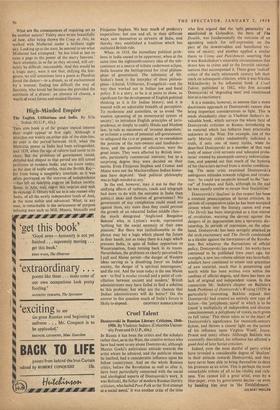Cruel Talent
IN Russia it has been the critics and the scholars rather than, as in the West, the creative writers who have had most to say about Dostoyevski, although Maxim Gorki's ambivalent attitude towards the artist whom he admired, and the publicist whom he loathed, had a considerable influence upon his fellow countrymen. And on the whole Russian
critics, before the Revolution as well as after it, have been particularly concerned with the social
and ideological aspects of Dostoyevski's work. It was Belinski, the father of modern Russian literary criticism, who hailed Poor Folk as the 'first attempt at a social novel.' It was another critic of the time who first argued that the 'split personality' as manifested in Golyadkin, the hero of The Double, was fundamentally the outcome of an agonising search for self-expression on the part of the downtrodden and humiliated vic- tims of society; and another applied a similar thesis to Crime and Punishment, asserting that it was Raskolnikov's miserable circumstances that drove him to crime and to the feverish rational- isations that accompanied it. These great 'radical' critics of the early nineteenth century left their mark on subsequent criticism, while it was Nikolai Mikhailovsky in his influential book A Cruel Talent, published in 1882, who first accused Dostoyevski of 'degrading man' and condemned him as a reactionary.
It is a mistake, however, to assume that a more doctrinaire approach to Dostoyevski cannot also bring important considerations. to light. This is made abundantly clear in Vladimir Seduro's in- valuable book, which surveys the whole field of Dostoyevski criticism in Russia; introducing us to material which has hitherto been practically unknown in the West. For example, one of the early Marxist critics undoubtedly indicated a truth, if only one of many truths, when he described Dostoyevski as a member of that vast body of minor civil servants and 'educated prole- tariat' created by nineteenth-century industrialisa- tion, and pointed out that much of the hysteria of his characters derived from a similar condition- ing. The same critic examined Dostoyevski's ambiguous attitudes towards religion and revolu- tion : 'he could not reconcile himself to the "hor- ror" of freedom and faith, although to the end he was equally unable to escape their fascination.'
Dostoyevski's 'dualism' in this respect has been
a constant preoccupation of Soviet criticism. In periods of comparative calm he has been accepted almost whole into the literary canon and even The Devils has been interpreted as a true mirror of revolution, warning the devout against The dangers of, its degeneration into a terrorjstic dic- tatorship. In periods of repression, on the other hand, Dostoyevski has been savagely attacked as the arch-reactionary and The Devils condemned as a slander against the forerunners of the Revolu- tion. But whatever the fluctuations of official policy, Dostoyevski has survived : his works have continued to be published (two years ago, for example, a new ten-volume edition was launched), scholars have continued to amass vast quantities of new material, much that is penetrating and worth while has been written even within the confines of official dogma, and there, has been no lack of original and independent voices. In this connection Mr. Seduro's chapter on Bakhtin's book Problems of Dostoyevski's Writing (1929) is particularly interesting. Bakhtin argued that Dostoyevski had created an entirely new type of fiction-7-the 'polyphonic novel' in which is to be found 'a multiplicity of independent and discrete consciousnesses, a polyphony of voices, each given its full value.' This thesis takes us to the heart of Dostoyevski's significance for twentieth-century fiction, and throws a clearer light on the nature of his influence upon Virginia Woolf, Joyce, Proust and many otheys. Although Bakhtin was eventually discredited, his influence has affected a good deal of later Soviet criticism.
Indeed, even the most dutiful of party critics have revealed a considerable degree of 'dualism' in their attitude towards Dostoyevski, and they have never been able to bring themselves to deny his greatness as an artist. This is perhaps the most remarkable tribute of all to his vitality and rich- ness. You cannot kill a great artist, even by a blue-paper, even by, government decree—or even by handing him over to 'the Establishment.'
GILBERT PHELPS










































 Previous page
Previous page